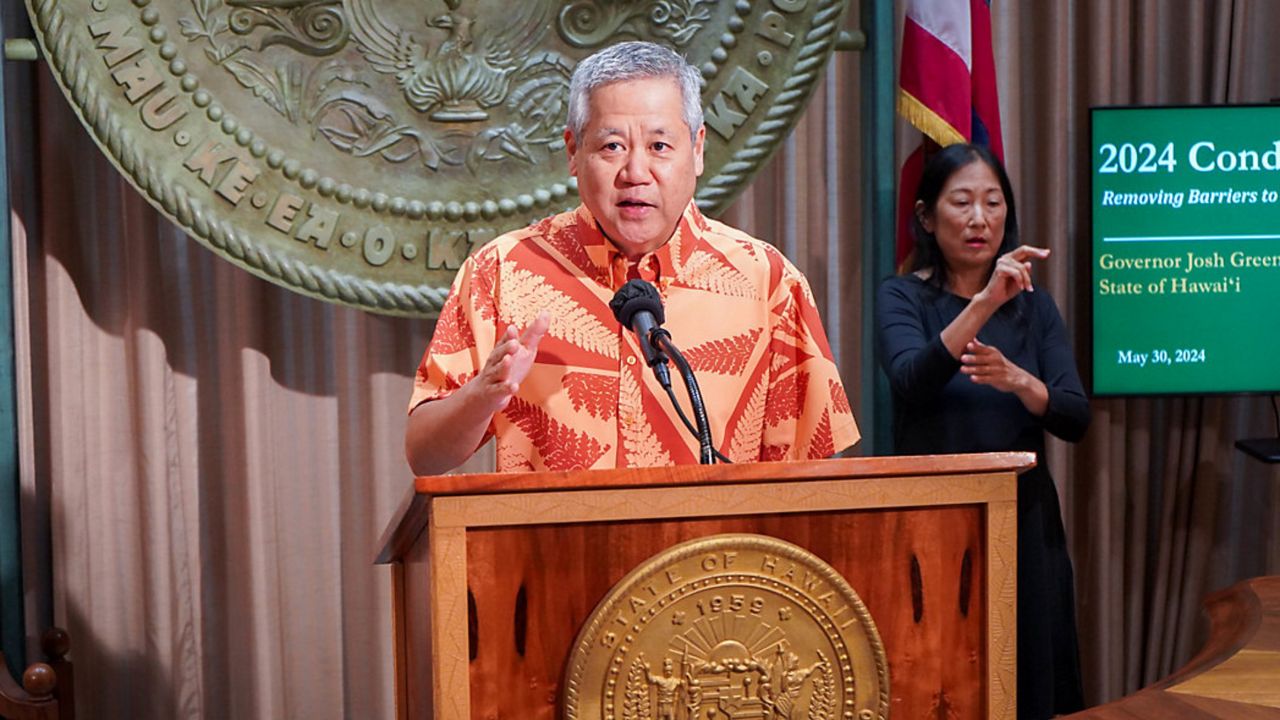HONOLULU — Gov. Josh Green took aim at issues facing the state’s condominium owners Thursday, enacting five legislative measures intended to streamline purchases, identify solutions for ongoing inefficiencies, help low- and moderate-income households afford solar energy systems and make it easier for owners to get commercial property assessed financing.
“The cost of living is affecting all of our residents in Hawaii,” Green said at bill signing ceremony on Thursday. “And that affects a lot of condo owners. Jamie (Green) and I are condo owners right here in (state House Speaker Scott Saiki’s) district. And the challenge that we’re facing right now is multifactorial. We’ve got insurance costs that are rising as climate risks increase. The (home owner) associations are seeing rising cost in struggling to deal with resident needs. You can see also that condo issues are a reflection of our broader affordable housing problems. And it’s becoming a crisis.”
Three of the bills take steps toward addressing a myriad of efficiency issues that hamper condominium purchases, management and other areas.
Senate Bill 2600, Senate Draft 1, Conference Draft 1, allows the use of email for certain condominium-related documents, thereby reducing burdensome paperwork processes involved in purchasing condos.
SB 2726, SD 2, House Draft 1, CD 1, requires the Legislative Reference Bureau to study how other states handle condominium-related issues, including the establishment of an ombudsman, licensing for management, alternative dispute resolution methods, governmental regulation, owner education, and access to documents.
House Bill 2315, HD 1, SD2, CD1, repeals provisions governing the use of electronic voting devices at condominium association meetings and clarifies the procedure for electronic meetings, electronic voting and mail-in voting.
Two other bills help condo owners and associations cope with rising costs.
HB 2685, HD 2, SD1, CD1, creates the Solar Hui Program, allowing multi-family residential property owners to invest in a fund that provides loans to low- and moderate-income households for installing solar energy systems.
“The concept is that people who live in condos who don’t have rooftops will be able to invest in a fund,” said Saiki. “This fund will finance solar, solar rooftop panels and batteries for people who live in homes that can’t afford to pay for those systems, or who can’t even get conventional financing for those for those systems.”
As Saiki explained, those who receive such rooftop improvements will be able to repay the loan over time through their utility bill. Meanwhile, investors will benefit from federal or state tax credits and possibly a dividend base that’s calculated based on the savings generated from the installations.
“So with the Solar Hui program, there’s a benefit at all levels,” Saiki said. “You have the investor who receives a financial benefit and individual homeowners who receive rooftop solar panels or batteries and wouldn’t have been able to do that but for this program. And then third, the environment because we’ll have more green energy generated in our state. So, it’s a really important program that benefits the entire state at different levels.”
Meanwhile, HB 2801, HD1, SD1, CD1, transfers the administration of the Commercial Property Assessed Financing program from the counties to the Hawaii Green Infrastructure Authority. It also allows condominium associations to be eligible for commercial property assessed financing.
“The C-PACER bill is really, really important because it’s going to enable condo buildings to become insurable,” Saiki said. “And that’s because this bill will allow condo associations to finance improvements to their buildings through a private lender, The loan will be repaid by unit owners in that building over time; it’ll be amortized over the life of the improvement.”
Such improvements might include the installation of fire sprinklers, replacement of aging water pipes, environmental remediation or other high-cost undertakings.
“There are two immediate benefits to the C-PACER program,” Saiki said. “One is because the loan is amortized, you avoid a large front-end assessment on unit owners. The second benefit is that the loan is repaid by individual unit owners in the building. So, if a unit owner sells the unit and moves, the new owner will assume that obligation so it goes from owner to owner over a period of time.”
Sen. Jarrett Keohokalole, chair of the Senate Committee on Commerce and Consumer Protection and the driving force behind the two measures in the Senate said the C-PACER bill provides a much-needed option for associations and owners to move forward on necessary but otherwise prohibitively expensive projects.
“We know that many of the owners and residents of condominiums are kupuna, retired people that are on fixed incomes, and so there’s just a lot of distress about the rising cost of assessments and association fees and all of that,” Keohokalole said. “So this is a complicated sort of technical measure that ultimately just means the financing to get this work that has to be done, done in the cheapest way possible.”
Green called the Solar Hui Investment Fund and expansion of C-PACER to condominium associations “critical tools in enabling more of our residents to participate in Hawaii’s clean-energy future.”
“By breaking down financial barriers, we are helping families reduce energy costs and move toward energy independence,” he said. “These legislative actions represent a significant milestone in our efforts to build a more sustainable and resilient Hawaii.”
Michael Tsai covers local and state politics for Spectrum News Hawaii. He can be reached at michael.tsai@charter.com.



